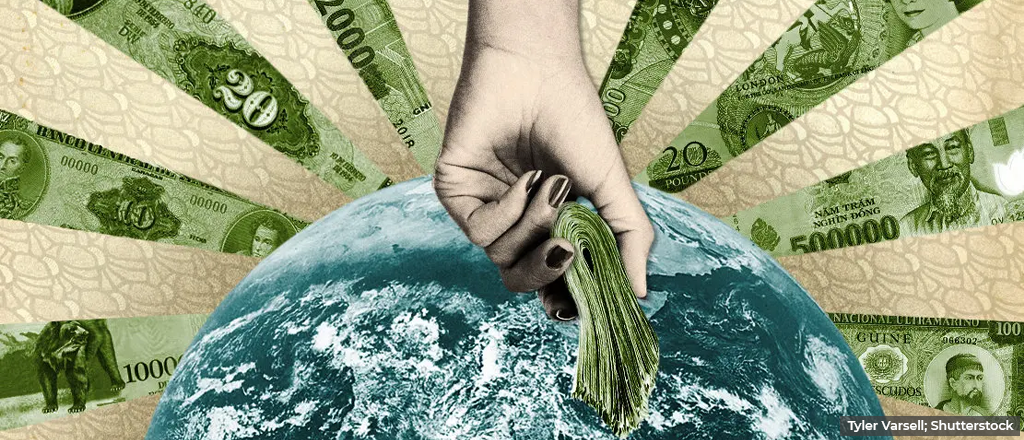

Faran Mahmood graduated from Cambridge University with majors in sustainable development. He has completed numerous assignments for the government, and was awarded Pakistan Telecom Authority (PTA) gold medal in ICT4D and President of Pakistan gold medal.
02.11.2021
After the ill-fated Madrid COP25 talks failed to produce real action for tackling climate change, this year world leaders are meeting again in Glasgow to renew their vows for fighting the “war against global warming” – with high hopes for an action-conducive consensus.
However, when it comes to moving from statements to concrete action, it leaves a lot to be desired especially in the arena of climate finance. Funding the costs of climate change has been one of the most contentious part of these annual meetings and under the principle of “common but differentiated responsibilities,” the onus is largely on developed economies.
In 2009, the COP15 event in Copenhagen ended with developed countries pledging to provide US$20 billion for the next three years and a long-term financing of US$100 billion/year by 2020 for developing countries affected by climate change.
The bad news is that this promise has not been fulfilled. In fact, EU and the United States have sidestepped calls for climate compensation to poor nations. In 2019, a year before the pandemic hit the world economy, only US $79.6bn in climate finance was mobilized. This year in G7 summit, the seven rich nations reaffirmed their $100 billion a year aid to fund actions for adapting to the inevitable effects of climate change in developing countries – though it didn’t mention how the US$20 bn gap shall be closed. Against this backdrop of slow economic growth and unwillingness of donors to continue pouring billions as aid money, it raises concerns whether the financial commitments as per the Copenhagen Accord are even achievable.
The good news is that the Biden administration has announced at the UN General Assembly to double its earlier pledge of US$5.7 billion to US$11.4 billion by the year 2024. However, U.S. presidents have a long history of making broken promises – with Barack Obama delivering only US$1 bn out of the pledged US$3 bn to the green climate fund while his successor Donald Trump reneged on that pledge altogether.
As per critics, even this new pledge by the US is insufficient. According to calculations done by a UK think tank Overseas Development Institute (ODI), the US has one of the highest carbon footprints (6.6 million tons of greenhouse gases annually) and the highest gross national income for decades; and it should be funding as much as US$50 bn every year. However, the US has contributed only 4% of its due share. And this comes from a nation that authorizes over US$700 bn annually for military spending, yet when it comes to responding to the non-traditional threat multiplier of climate change, the US government is in denial.
In fact, developed economies (and now China as well) have been usurping far more than their fair share of the global carbon budget (for 2 degrees) at the expense of developing countries. So, the expectation from low and middle-income countries to reduce their emissions by shutting down coal plants while the rich have not kept with their US$100 bn per year promise is extremely unfair. Even this $100 billion goal is insufficient and to achieve the net-zero transition, the developing world needs investments in low-carbon projects that exceed even US$ 1 trillion per year. Moreover, the cost of capital for the global south to fund green projects is way higher than it is for the developed nations.
The west needs to understand that there is no low-cost alternative development pathway for emerging economies that doesn’t point to higher emissions. Expecting the global South to go along with net-zero targets without green investments at the scale of trillion of dollars is a wild idea. The US-style consumption by the West that has fuelled the economic engine for decades is a part of this problem as these rich countries are causing gross inequalities in consumption and carbon emissions. The carbon footprint of COP26 in Glasgow itself is expected to be around a whooping half a million tonnes!
It is high time that the west finally deals with its cognitive dissonances and agrees to give up an economic growth model that is driven by fossil fuels, aviation industry, extravagant lifestyles, and military-industrial complexes. If the G7 countries choose not to be concerned with that, they should be ready to bring more money to the table then.
Disclaimer: The views expressed in the article are of the author and do not necessarily represent the institute’s policy.

